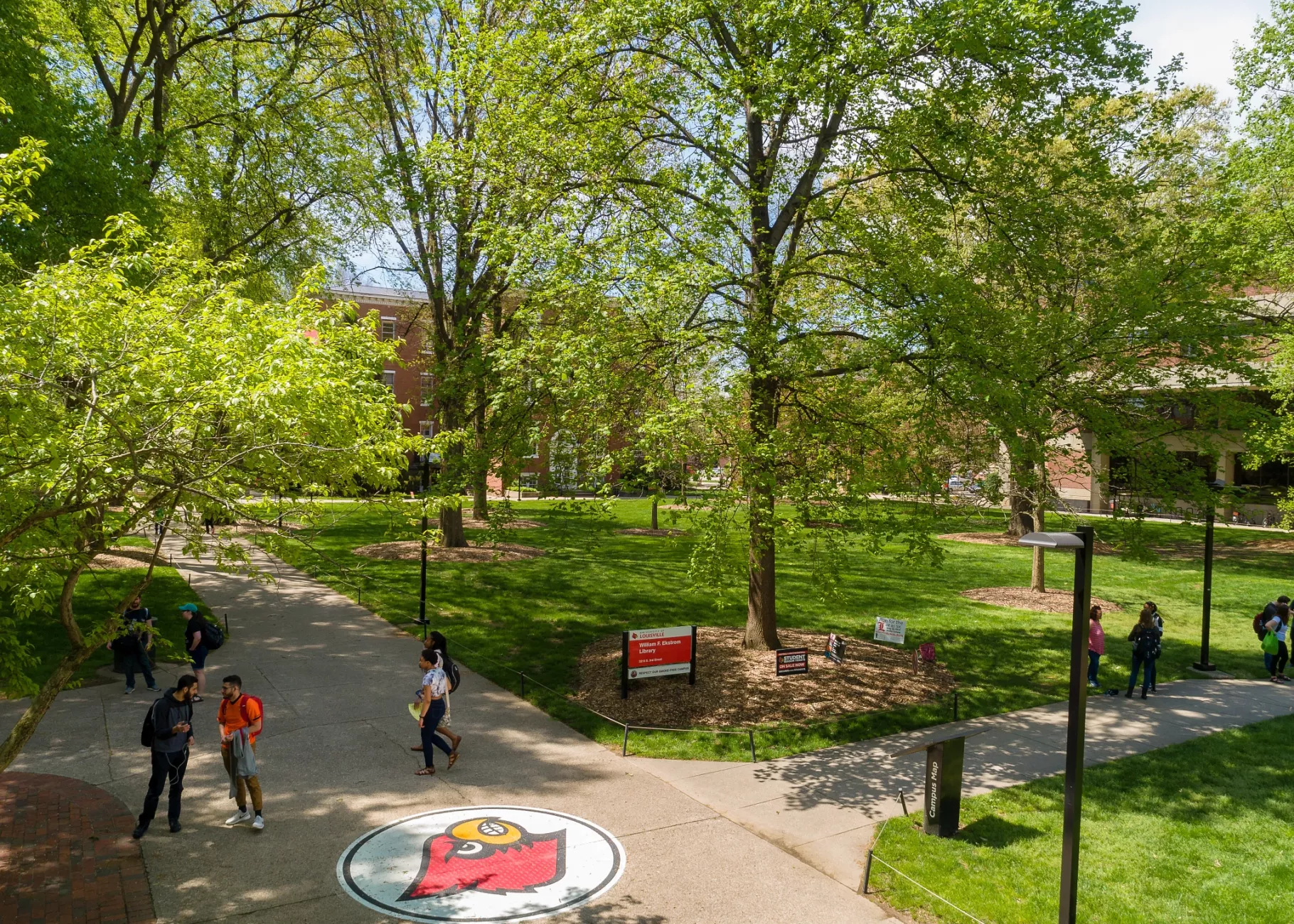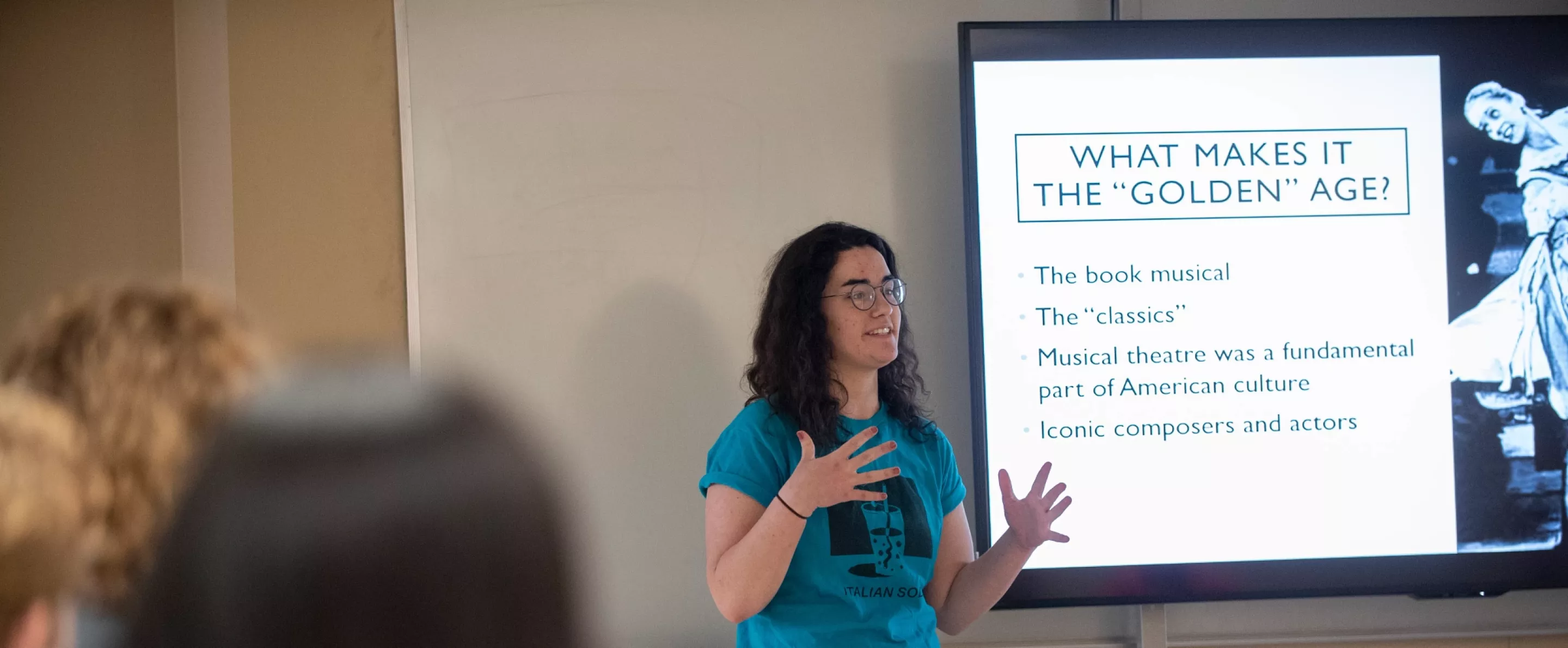Sidebar
Our Mission
The Music History program at the University of Louisville School of Music offers a multi-faceted approach to the study of music across different historical and cultural contexts.
What We Do
Our courses emphasize skills that will help to prepare students for 21st-century careers in music, including critical thinking, research methods, listening and score study, communication, and digital literacy. In addition, we seek to inspire students to develop their curiosity and empathy for musical understandings and experiences beyond their own. Graduate students can take seminars on an array of topics and have the chance to work closely with our music history faculty. Undergraduate music majors take a three-semester music history sequence that covers music from antiquity to the present, as well as courses in African-American music and world music. For the general student population, we offer courses that cover musical genres including rock and roll, country, jazz, hip hop, music of the Broadway theater, film music, pop music, and electronic dance music. In addition, we offer both Bachelor’s and Master’s Degrees in Music History for students who wish to focus on the study of music history. In keeping with the goals of the University and the School of Music, the music history concentration is committed to fostering equity and inclusion in the curriculum approach. Additionally, we aim to create opportunities for the music therapy profession to advance in the Louisville area by supporting and openly collaborating with therapists vested in our community.
Academics
The Bachelor of Music in Music History degree is especially suitable for students who have academic aspirations and are developing an interest in pursuing the study of music history at the graduate level. In addition to the music history sequence of courses required of all music major students, music history majors take additional seminars in areas of historical and critical study, and develop skills in (among other things) research methodologies. Research techniques and effective written/oral communication skills must be demonstrated by the development and presentation of a senior paper.
Learn more about degree programs and classes.
Master of Music in Music History
The MM in Music History program, a two-year course of study, is particularly suitable for those who wish to explore further both the content and the methodologies by which the history of music may be critiqued and investigated. Applicants must have an undergraduate degree in music or its equivalent.
| Recently Offered Graduate Seminars | |
|---|---|
|
|
Application Procedure:
For your application to be given full consideration for scholarship, teaching and other financial awards, all your application materials must arrive by February 1 (preferably sooner). As such, please make your enquiries without delay and plan on submitting your application as early as you can. Application enquiries should be sent to gomusic@louisville.edu. Questions about writing samples (described below) should be addressed to Professor Devin Burke at
devin.burke@louisville.edu.
In your online application, please include the following as attachments in addition to the other required materials:
- Letter of intent. This should contain information on your musical background and training, teaching experience (if any), and other information that may be relevant to your application. Specify also if you intent to apply for financial assistance.
- Curriculum vitae. Please include aspects of your background regarding education, work experience, achievements, and other endeavors.
- Writing samples. Two writing samples of your work on music history are required. While research papers written for undergraduate music history courses suggest themselves, it is important that you submit your best work regardless of the purpose for which they were written. At least one of the two samples must discuss music in a substantive way. Analytical papers giving a blow-by-blow account of the music are discouraged, as are papers consisting of substantial borrowings from other sources. Each submission should not exceed twenty pages. For exceptions to this page limit, please contact Professor Devin Burke at devin.burke@louisville.edu.
Music History and Theory Examinations:
All successful applicants to the MM program who have accepted the university’s offer to enroll are required to take examinations in both Music History and Music Theory, typically in the week before classes begin, for the purpose of gauging competencies. Students who do not pass the examinations will be required to take remedial classes in Music History (MUS 500) or Theory (MUS 400) or both, as the case may be. Information about how to prepare for these examinations will be sent in due course.
Learn more about degree programs and classes.
Faculty Information
Additional Information
To apply for any of these awards, complete the application for graduate school, submit it by the February 15 deadline, and include a request for consideration for applicable awards and a statement of purpose with your cover letter. An assistantship and a service award may not be held at the same time.
Graduate Assistantships in Music History
For graduate students enrolled in the MM degree program as Music History majors and carrying a full load of nine hours of course work in music per semester.
- Award: Tuition remission
- Stipend of $7,500 per year
- Health Insurance Benefits
- Renewable for a second year if performance satisfactory in first year
Duties: Observation, clerical work, tutoring, grading (no more than 10 hours per week), occasional supervised teaching of undergraduate music history classes.
Qualifications: BM degree and a good command of the English language; successful work in music history courses at the undergraduate level.
Application: Graduate School application form with letter of application to the Music History Division stating objectives and goals and requesting consideration for the assistantship, two letters of recommendation, official undergraduate transcripts, examples of formal writing (papers written for undergraduate music classes) and a personal interview.
Herz Award in Music History
- Award: Variable
- Qualifications: BM degree and enrollment in MM degree program as a Music History major.
- Duties: As assigned
Service Awards in Music History
- Award: Tuition remission
- Duties: Approximately 10 hours per week, as assigned
- Qualifications: BM degree
Ensemble Performance Scholarships
- Award: Variable, based on quality of ensemble audition
- Duties: Participation in a School of Music ensemble
- Qualifications: BM degree, audition
Kentucky Indiana Reciprocal Tuition
Residents of southern counties in Indiana may be eligible to participate in the program that provides tuition remission for out-of-state tuition for study at the University of Louisville. Please check with the School of Music office about this possibility.
In addition to an extensive collection of scores, books, periodicals and recordings, the University of Louisville Music Library holds a number of unique resources for original research in music history.
For more information about these and other special collections held by the University of Louisville, visit the music library website.
The Gerhard Herz Collection
Renowned Bach scholar Gerhard Herz, who taught at U of L from 1938 to 1978, left his career-spanning collection of research materials to the university, among which are photographic reproductions of most of Bach's manuscripts from 1704 to 1750, notably those in the Berlin State Library (2,065 items, many of them autographs), as well as lecture notes and notes for his extensive body of published work. The collection also includes microfilm, positive prints of Bach manuscripts, and offprints of Herz’s articles.
The Grawemeyer Collection of Contemporary Music
The Grawemeyer Collection comprises over 2,500 music scores and recordings submitted to the Grawemeyer Award for Music Composition since its inception in 1985. Some of these materials remain unpublished and are accessible only in the Music Library. Winners of the award have included John Adams, Thomas Adès, Pierre Boulez, Karel Husa, György Ligeti, Witold Lutoslawski, Krzysztof Penderecki, Kaija Saariaho, Tan Dun and Joan Tower.
The Isidore Philipp Archive
Isidore Philipp (1863-1958) was a French pianist whose teachers included students of both Chopin and Liszt. His friendship with Dwight Anderson, the first Dean of the School of Music, led to the establishment here of the Philipp Archive, including Philipp's compositions and exercises as well as his editions of music by Liszt and other composers. Also included are sound recordings, photographs, correspondence and other memorabilia.
The Jean Thomas Collection
Jean Thomas (“the Traipsin' Woman”; 1881-1982) was the producer of the American Folk Song Festival in Ashland, KY through its entire history (1931 – 1972). This is a collection of materials related to the festival.
The Louisville Imprint Collection
A collection of some 1,500 songs, piano solos and other compositions from mid-nineteenth century Louisville music publishers.
The Ricasoli Collection
The Ricasoli Collection is part of a private music library of over 400 manuscripts and early prints, some rare, assembled by the Florentine branch of the Ricasoli Zanchini family between 1750 and 1860. It includes both sacred and secular repertory.



